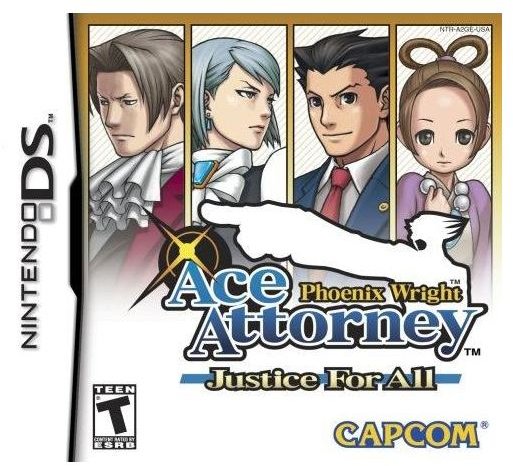Phoenix Wright: Ace Attorney - Justice for All Review for Nintendo DS

In October 2005, Capcom did something I never thought possible. They released a courtroom simulation game that put you in the role of a defense attorney, and actually made it fun. So obviously, having already struck gold with an English-language version of the formerly Japanese-only Gyakuten Saiban titles, they went back to the well hoping to duplicate their success. The second Phoenix Wright: Ace Attorney game, subtitled Justice for All, was released in the U.S. in January 2007, roughly 15 months following the series debut in North America. While there have been some minor tweaks, the bottom line is that for better or worse, not much has changed.
Story (4 out of 5)
This time around, there are four cases instead of the five found in the original Phoenix Wright: Ace Attorney, which is a little disappointing. In the first one, Phoenix is suffering from amnesia while trying to win an acquittal for a young female police officer accused of murdering her partner/possible boyfriend. His temporary loss of memory serves as a tool to provide new players with a tutorial level, to learn the ropes, and it works as good as any other reason, I guess. Many familiar faces return, including Wright’s assistant Maya (a key figure in the second case), police detective Dick Gumshoe, prosecuting attorney Miles Edgeworth and photographer Lotta Hart. Once again, the plots are generally solid, but the storytelling can get ridiculously over-the-top at times and the writing can be a little inconsistent (not to mention plagued by the occasional typo). Personally, I still believe that if it was a little more buttoned-down and serious in tone, it could have been something truly great. Fans of the first one should find a lot to like here, though, especially since you feel a greater connection to the principle characters.
Gameplay (5 out of 5)
Just as in the original Phoenix Wright, players will need to investigate, find evidence, interview people involved with each of the cases and eventually step into the courtroom to use a variety of different techniques to earn a “not guilty” verdict for their clients. Things are a little more involved and a little more intense this time around, which is most welcome. You will need to press witnesses at certain times. Instead of being allowed five mistakes, no matter what they are, this time you will have a life bar. The bigger the mistake, the more “health” you lose and the closer your client is to conviction. In fact, one big error can blow the whole case if you’re not careful. This adds to the sense of realism, and is a most welcome addition. Also new this time around is the “Psyche Locks” system. When these appear, it means that the person Phoenix is interviewing is hiding something, and using persuasion and evidence, he must uncover the secrets. The core concept is neat and it works well, but for some silly reason, the developers felt the need to tie it into psyching powers instead of just making it based on Wright’s investigative intuition. Why does an accomplished attorney need to rely on “magic powers” to tell when someone’s lying?
Graphics and Sound (3 out of 5)
If you enjoyed the anime stylings, the goofy flamboyant character motions and the music in the first Phoenix Wright game, you’ll feel right at home here. Stop reading now and skip to the overall rating, because you won’t like anything I have to say here. Why? Because the silly visual style drove me crazy in the first game and it drives me crazy here. The extreme imagery used to convey emotion just feels completely out of place in a game like this, and it’s just as bizarre here as it was in the original. Fortunately, the quality sound effects return, and the music has been toned down and is actually halfway enjoyable to listen to. As a result, Justice for All is deemed a point better in the presentation department than its predecessor – even if I can’t stop thinking about how great it would be if a game like this used, say, Hotel Dusk’s graphics engine.
Images
Overall Rating (4 out of 5)
All in all, this is another fine effort from Capcom. Phoenix Wright: Ace Attorney - Justice for All is, like the game that came before it, a surprisingly deep and enjoyable game. Since the characters are more familiar, the stories become all that more interesting, and I can’t tell you how many times that I kept trying to mentally piece things together, trying to identify possible suspects and motives while playing. It truly is great fun, and in many ways, the sequel outdoes the original. The music is better and the gameplay is more intense. The processes, including the Psyche-Locks system, are more detailed and meticulous, and thanks to the life bar, the penalty for failure in certain situations is immensely steep. That added pressure made me all the more determined to catch every detail and crack each of the cases. My gripes about the anime-styled graphics and the production values aside, Justice for All is recommended for fans of both adventure games and visual novels.
